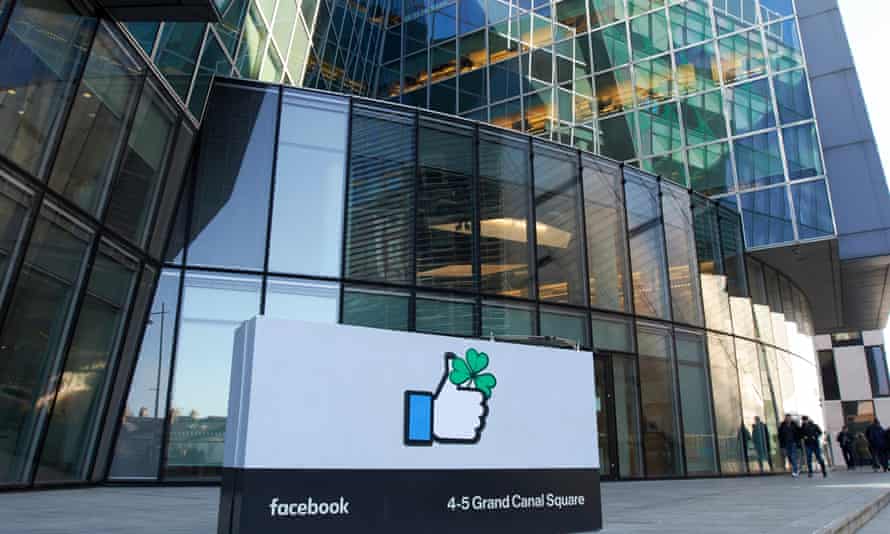Facebook moderators ‘told not to discuss working conditions’
Workers in Dublin office claim US company used NDAs to try to stop them talking to Leo Varadkar
Facebook’s Ireland HQ in Dublin. Workers have been forced to work in the office throughout Ireland’s high-tier lockdown. Photograph: Radharc Images/Alamy
Alex Hern Technology editor
Thu 11 Feb 2021 18.40 GMT
123
Facebook has been accused of using nondisclosure agreements to try to build a “wall of secrecy” and prevent its moderators from discussing working conditions with Leo Varadkar, the Irish tánaiste (deputy PM).
The moderators claim that Facebook warned them they could not break a nondisclosure agreement (NDA) they had signed with the company during discussions with Varadkar, and warned them that any discussion of their work outside the office would be treated as a disciplinary offence.
The workers, who are being forced to work in the company’s Dublin office throughout Ireland’s high-tier lockdown, were afraid of being sacked if they spoke to Varadkar about their working conditions. They sought guarantees from the company that they would not face legal action for doing so.
Instead, according to correspondence seen by the Guardian, Facebook gave only partial permission. The company said it had “no issue” with the moderators “discussing matters relating to their work” or “other information that is in the public domain” but, it added, they could not share information covered by their “contractual confidentiality obligations”.
In a follow-up letter, the workers asked Facebook and Covalen, the third-party contracting firm that is their direct employer, for a copy of those obligations, but received no reply.
Phoenix Law, the human rights lawyers representing the moderators, said the workers had not seen a copy of their nondisclosure agreements since they signed them on their first day of work.
“Facebook requires content moderators to sign a confidentiality agreement at the end of induction training, without furnishing copies of the materials or agreements,” the moderators alleged.
They say that as recently as 18 January, just a few days before the meeting with Varadkar was scheduled, “moderators working for Facebook were warned that any discussion of their work outside of the Facebook office would be treated as a disciplinary offence”.
Facebook argues that because the moderators are directly employed by Covalen, it has no direct responsibility for their communications.
In a statement, the social network said: “Facebook has legal obligations to protect user data and personal information.
“These obligations require Facebook to have confidentiality, privacy and security terms in their supplier contracts, and for their suppliers to convey these obligations to their employees – either through legal documents like NDAs, training, or other means.
“The confidentiality agreements that Covalen employees sign are issued and retained by their employer, Covalen. Facebook does not have NDAs with these content moderators.”
The workers are being supported by Foxglove, a London-based human rights non-profit that fights to “make tech accountable”.
Foxglove’s cofounder, Cori Crider, said: “We were able to say: ‘These people have the right to speak publicly,’ and Facebook knew that they couldn’t come in and try to stop these people talking to the former prime minister.”
In a statement, Covalen said: “As part of our recruitment process, every Covalen employee receives a confidentiality agreement via email, along with their employment contract.
“Covalen requires each employee to sign the confidentiality agreement and return via email, together with their employment contract, before commencing employment.
“As such, there is never an instance where an employee does not receive a copy of their confidentiality agreement. If an employee misplaces their copy of the confidentiality agreement, our human resources team is more than happy to provide them with a copy.
“Covalen respects the rights of our employees to meet with public representatives but we always encourage employees, when issues arise relating to their employment, to engage with the company through our internal processes first in order to see if they can be resolved.”
In October, as Ireland was entering a high-tier lockdown in which only essential workers were allowed to leave their homes, Facebook moderators working for the contracting firm CPL, a Covalen subsidiary, were told that they were still required to attend the office.
The moderators were told that they were classed as “essential communications workers”, and while shielding moderators were allowed to remain at home, those who had vulnerable relatives at home were given no such leeway. In the first two months alone, three cases were linked to the office.
As well as Covid safety, the Facebook moderators discussed the “climate of fear” that pervades their workplace with Varadkar.
“Through a culture of excessive secrecy and over-broad NDAs, Facebook has chilled moderators’ right to assembly and expression, to access representatives and to blow the whistle about unsafe working conditions,” they said.
“Quality scores, extremely granular time tracking (including tracking, for example, bathroom time) and other workplace surveillance create a culture that is undignified and causes moderators needless stress.”
